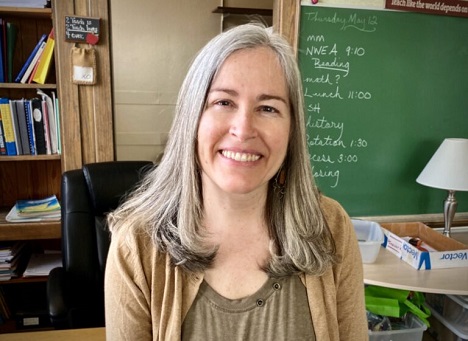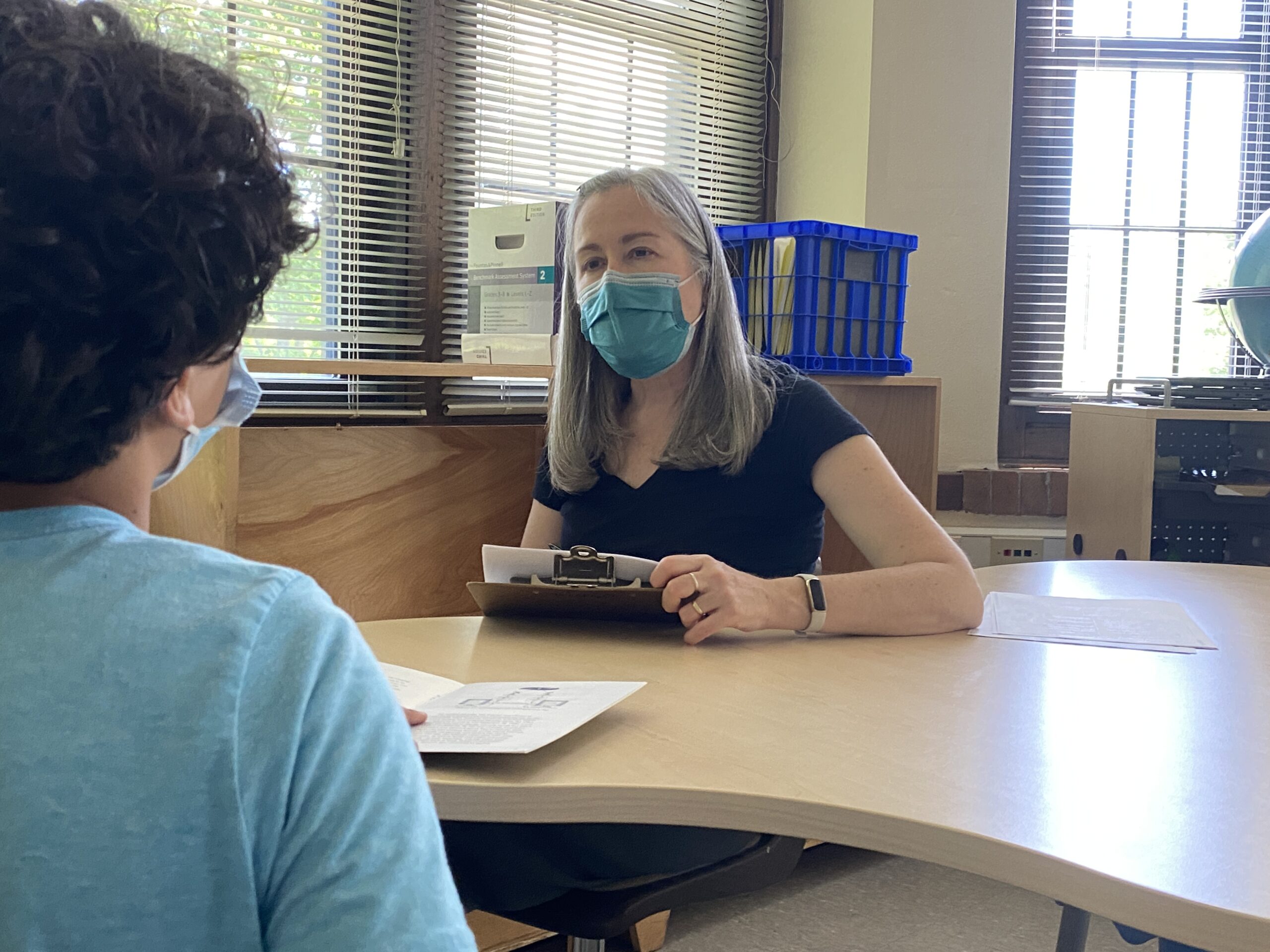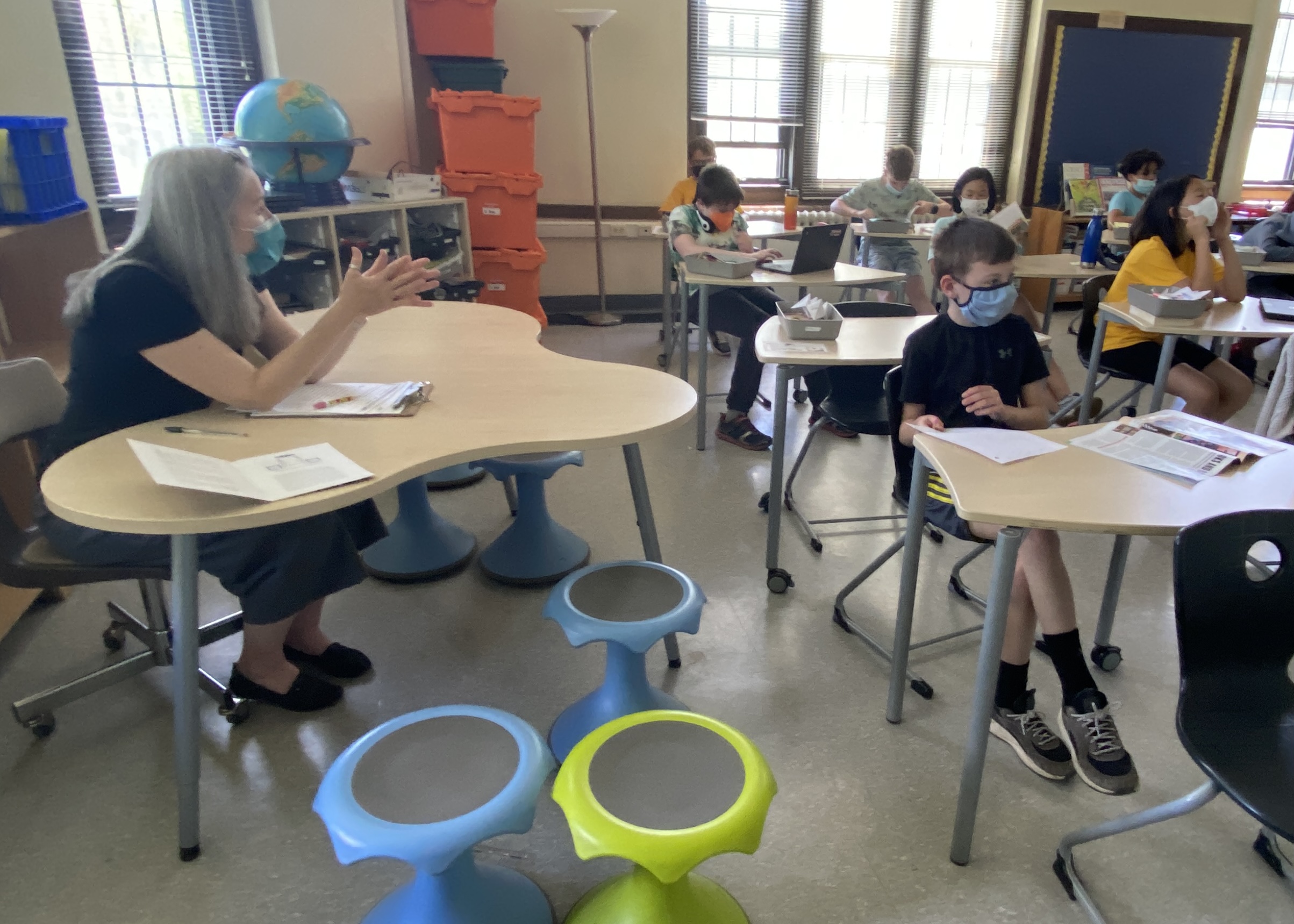AAPS Exceptional Teacher: Anita Ringo, fifth grade teacher at Bach Elementary

By Jo Mathis/AAPS District News Editor
Anita Ringo is a fifth grade teacher at Bach Elementary School who has been a dedicated classroom teacher in the Mack and Bach communities for more than 33 years.
“Ms. Ringo is an integral member of the Bach community who is loved and highly respected,” says Bach Principal Colette Ivey. “Ms. Ringo passionately models the process of learning, with the goal of each and every student becoming a lifelong learner. She is a strong advocate for each of her students and is deeply committed to the rich traditions that make Bach Elementary School such a great place to learn and grow each day.”
Ringo grew up in the city of Detroit’s west side. She says that all of the challenges and turmoil of Detroit in the 1960s and 70s shaped her perspectives and determination to build a life of work towards racial and social justice. She is the second oldest of the five Ringo children but quips that anyone who knows them all will insist she’s the most mature. Ringo’s two sisters and two brothers live in Chicago, Toronto, and Los Angeles and share her passion for making the world a better place.
Ringo moved from Detroit to Ann Arbor to attend the University of Michigan and never moved away. At first unsure about her career direction, she considered becoming a lawyer, famous author, and governor of Michigan before finally heeding her heart’s prompting towards working with children.
She received a bachelor’s degree and teacher’s certification in 1988 and accepted an offer to join the staff at Clague Middle School on the day she finished her student teaching there. She was moved from Clague to Mack Elementary against her wishes, only to find that she loved teaching elementary students. She has taught in the Mack / Bach Community for almost 34 years.
Ringo has led the Ann Arbor Education Association Elementary Caucus for years, and her leadership and fierce advocacy for elementary members has made that caucus one of the strongest arms of the AAEA, said AAEA President Fred Klein.
“In addition to being a stellar educator, she is a stellar leader within the AAEA.” he says. “She has an innate and natural ability to listen, reflect, and provide excellent solutions for concerns and issues brought forth by our elementary reps.”
In 1984, Ringo married her best friend, George Kasotakis. They have two grown children who are both teachers. Zachary and his wife Keily live in Arizona where he teaches middle school science and raises Ringo’s beloved granddaughters Joanne and Kathleen. Daughter Isabel lives in Denver where she is pursuing a graduate degree in school psychology and still calls her mom for help with editing school papers.
When she is not working at school, Ringo spends time doing things that she knows help her to be a better teacher. She loves to read and says she doesn’t own a television because watching TV would leave her less time to read. She says she does pilates for two reasons: Exercise. And because the people in her Rec and Ed pilates class are so fun to laugh with. She grows roses all over her yard on Miner Street and cultivates friendships with small children on her block by offering them jelly beans. She writes musical productions for her next class of fifth graders at Bach and practices by singing along to pop songs on the radio. She loves books, chocolate, Detroit Tigers baseball, long walks, breakfast on the weekends, and talking about things that matter with her family and friends.
What are your reflections on this 2021-22 school year as it draws to a close?
This was a very different year from the other 33 I have spent teaching. My students and I spent the first few months of this year just happy to be together in the room. We all needed to recover from the losses of the Covid experience of the previous 18 months. Some of my students needed intensive academic “catching up.” Some needed time to remember how to socialize with others. Most of us carried that sense of waiting for the next shut-down well into this year. The lack of security and predictability affected so much of how we interacted. One thing that struck me about the students in my class this year is how kind they are with everyone. They do not take their friendships for granted. They are extraordinarily cooperative and supportive of each other. That has been a beautiful thing.
You’ve been teaching at AAPS since 1988. What are the biggest changes you’ve seen in the past 34 years?
Some things have changed continuously. Curriculum turnover seems to happen every five years or so. I have taught fifth grade for so many years that I’m fortunate to have been able to keep hold of the curriculum versions that work well and have lasting effects on my students. But it is tough when “something new” comes along and we’re told to throw out the old stuff. As a veteran, you know the difference between a passing fad and a high-quality addition to your collection of materials. I like to think my collection is pretty good by now, but AAPS is big on being on the cutting edge.
AAPS has struggled to address inequities in our institution for the last 34 years. I have participated in our efforts to eliminate racial bias and close the racial “gap,” to include students with different learning abilities into “mainstream” classrooms, to validate and support LGBTQ+ students, to remove the stigma of being poor and all of the other injustices that make our children feel as though they don’t belong and they can’t succeed here. What has not changed is that this school system, as a collective, continues to work to improve on all of this. People work here because they believe in this kind of justice. We still haven’t gotten it right, it is frustrating, but it is evident to me that my colleagues really do Love all of our children and will keep working to make things better.

What talent do you wish you had?
I wish I could fly. I could get to places I need to be so much faster.
What advice would you give to a first-year teacher?
You have to love your students—all of them, even on their worst days. They need you to coach them, nurse them, counsel them, feed them, listen to them, inspire them, be honest with them, teach them to manage their behavior and emotions, and, oh yes, instruct them in academic subjects. That last one may be the one you save for last after you have established everything else.
This job will require you to consider the needs of everyone else in your life before yourself. Your students cannot afford for you to give them less than your complete and undivided attention and energy while they are in your care. This will be exhausting. And the most rewarding work you’ve ever undertaken.
Be prepared to fight the same battles over and over again. Just when you think you have conquered that problem, resolved that issue, nurtured that student back into full strength; the year will end, a new one will begin, and you will face more of the same with different faces and personalities. It will never end. This is the heart of your vocation.
You can sustain all of the above if you remember that you have colleagues who are living this life with you. Lean on them. Laugh and cry with them. They will remind you of what you love about this job.

Why did you want to work with the AAEA, and what makes you most proud about that work?
The purpose of the union is to take care of our own needs as working adults. So much of being a teacher is focused on anticipating and meeting the needs of others that many of us burn out on ourselves. Our union is the mechanism we use to look after our own needs as employees. AAPS pays us to devote our time and energy to our students. Our union protects our rights and advocates for our own mental, social and physical health. The union is the group of colleagues I mentioned above that makes sure all of the giving we do for others still leaves us enough to be whole people.
No one can do this job alone. We need to be able to turn to each other for advice, perspective, support, a place to vent, and people who get us. That is the purpose of our union. We support each other in this important work that we do, and it’s important that we do it together.
What’s one of your hidden talents?
I am a really good writer. I can also sing. When we go to overnight camp in the spring, I always sing my cabin to sleep.
What would you do with an extra 10 hours per week?
I like to think that I would take longer walks or maybe cook some delicious meals, but I would probably spend six of the 10 hours sleeping.
Do you have a morning routine?
• Make my bed every day. (Yep, every day. Don’t judge.)
• Try to dress for temperature differences of up to 30 degrees in Room 302 (layers!)
• Make sure my shoes match (75% success rate).
• Morning yoga.
• Apple or pineapple juice.
• Kiss my sweetie and say, “Have a great day. See you in 10 hours!”
What song do you know all the lyrics to?
I know soooo many songs. It is easier for me to memorize words when they are put to music. Songs are a great way to memorize anything.
How do you keep students engaged?
I keep students engaged by being excited about what happens in our classroom. I wake up every morning wondering, “What are we doing today?!” There is always something that I look forward to: a particular math lesson (tessellating geometric patterns, the DRUMS-B long division algorithm, the four 4’s problem!) History is always fascinating (the meeting of three worlds, Discovery 3 colonial role play, American Revolution tug-of-war). I love science (mystery powders under the microscope, lighting the light bulb, human body studies with Bob and Igor!) and reading books with students (“Joey Pigza Swallowed the Key”; “Holes”; “Dovey Coe”; “Linked”; all of the Cinderellas; “A Long Way From Chicago”).
We are so busy being involved in what we are learning that the worst thing that can happen is having to leave the class. We are often late for lunch. Sorry, Mrs. Salvner.
I know that if I love what I am doing and create a classroom where my students feel that enthusiasm, they will love being there and learn more than they ever knew they could.
What is the most rewarding part of teaching?
I love everything about this profession. It suits me. Teaching allows me to be creative and to express my talents in talking, listening, singing, reading, and writing. Teaching has brought me friends and an entire community where I am valued and able to make a contribution.
Teaching allows me to feel that I am making an important difference in the world. It is my venue to make the world a better place by influencing another generation.

























